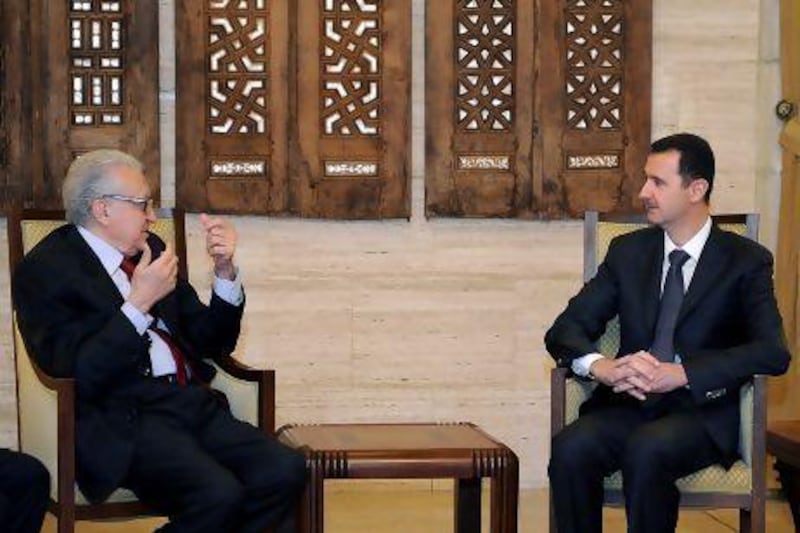The Syrian regime has deployed bombs containing a killer gas while fighting rebels in the central city of Homs, activists said yesterday.
The allegations came as Russia, a Syrian ally, warned president Bashar Al Assad that it would be "political suicide" for his government to use chemical weapons in Syria.
Russia's foreign Minister Sergei Lavrov told Russia Today that Mr Al Assad had given Moscow repeated assurances he had no plans to order such an attack. "I do not believe Syria would use chemical weapons," Lavrov said. "It would be a political suicide for the government if it does."
But the Syrian Observatory for Human Rights said yesterday that it had received reports that Assad's military had used a toxic gas during street clashes with rebels. "Activists in Homs say that six rebels died on Sunday night on the Khalidiya-Bayada front line because they inhaled odourless gas and white smoke," said the Britain-based Observatory, which relies on a network of activists, lawyers and doctors to document Syria's raging conflict. "Gas spread in the area after regime troops threw bombs that gave off white smoke as soon as they hit the walls," said the Observatory.
"Those who inhaled the gas felt nauseous and suffered severe headaches. Some suffered fits," it added. "These are not chemical weapons, but we do not know whether they are internationally prohibited," said the Observatory's director Rami Abdel Rahman. "Activists say it is the first time they have recorded these effects," he added. "They are not conventional weapons." The Observatory called on the International Committee of the Red Cross to urgently send a specialised medical team to Homs, several of whose districts have been besieged by army forces for more than six months.
The Local Coordination Committees (LCC) also reported the use of "bombs containing gases" in Homs. "These gases lead to muscle relaxation, severe difficulty in breathing and the narrowing of the iris," said the LCC, a grassroots network of activists.
Video filmed by activists and distributed online by the LCC showed a man laid out on a stretcher struggling to breathe as an unidentified doctor held an oxygen mask over his face. "It's definitely a poisonous gas, but we don't know what type it is," said a field doctor. "This man has been injured by the gas. We do not know what type of gas it is. It is definitely not sarin," he added.
US president Barack Obama has led international warnings to Mr Al Assad over Syria's chemical weapons arsenal but Damascus has repeatedly insisted it would not use the arms against its own people.
Russia has remained Syria's main ally throughout 21 months of violence that an opposition monitoring group says has claimed more than 44,000 lives. It scuttled three rounds of UN Security Council sanctions against Mr Al Assad and condemned Washington for recognising the Syrian opposition as the legitimate voice of the country's citizens. Moscow's position has frustrated western attempts to end the bloodshed by forcing Mr Al Assad from power.
But Russia also remains one of the only nations to remain in constant contact with Mr Al Assad - a status the West has urged it to use to pressure him to cede power.
Mr Lavrov said Moscow checks on every report about the movement of Syrian chemical weapons with Damascus to make sure there was no danger of their possible use. "Every time we hear rumours, or pieces of information come to surface that the Syrians are doing something with the chemical weapons we double-check, we triple-check, we go directly to the government and all the time we get very firm assurances that this is not going to be used under any circumstances," Mr Lavrov said.
On the diplomatic front, the international envoy to Syria said after talks with president Bashar Assad yesterday that the situation in the country was still "worrying" and gave no indication of progress toward a negotiated solution for the civil war.
Lakhdar Brahimi said he and Mr Al Assad exchanged views on the crisis and discussed possible steps forward, which he did not disclose. He spoke briefly to reporters after meeting the Syrian leader at the presidential palace in Damascus. "The situation in Syria is still worrying and we hope that all the parties will go toward the solution that the Syrian people are hoping for and look forward to," Brahimi said.
Syria's state news agency quoted Assad as saying his government supports "any effort in the interest of the Syrian people which preserves the homeland's sovereignty and independence". Mr Brahimi has apparently made little progress toward brokering an end to the conflict since starting his job in September, primarily because both sides adamantly refuse to talk to each other.
Brahimi's two-day visit was to end later Monday. It is his third to Damascus as an envoy of the United Nations and the Arab League. The security situation in Damascus and elsewhere in the country has declined since Brahimi's previous visits. Instead of flying in to the Damascus International Airport as he did on earlier visits, Mr Brahimi drove to Damascus over land from the Lebanese capital Beirut because of fighting near the Damascus airport.
* Agence France-Presse and Associated Press





